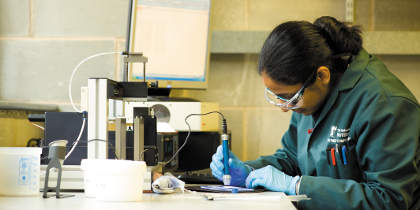
January 16, 2007, by Teaching at Nottingham
An inverse method of teaching specialised subjects: decomposing a representative example to sustain analysis and interaction of details
Dragos Axinte: “The project discusses an example of teaching specialist manufacturing processes by identifying a ‘representative product’ (RP) from which key manufacturing processes can be isolated, analysed and interconnected to enable the understanding of how complex entities, i.e. products, are generated and made functional.
“Teaching specialist manufacturing subjects is nowadays a challenge due to fast advances of processing techniques coping with ever-growing products’ diversity and regional changes/priorities of manufacturing industries. By outsourcing “less value-added” industries, the UK has changed its manufacturing profile and with it the job specifications for engineering graduates. Teaching manufacturing technologies in general descriptive manner while omitting their specific interactions that contribute to the realisation of products might be inappropriate; significant teaching effort can be spent discussing processes that might have been outsourced, replaced or even banned. In this context, new engineering courses appear to fill the needs of changing industrial environment. Product Design and Manufacture (PDM) is a new course within School of M3 for which a new module, Manufacturing Process Capability (MPC) was developed as an ‘inverse’ method of teaching specialist processes.
“Literature survey revealed that little attempts have been made to teach specialist manufacturing subjects by integrating them into a unitary product. Tending to cover a wide spectrum of processes, or narrow specialist areas, previous approaches suffer from lack of topic integration; this is evident when examples from various industrial domains are used in these lectures that result in neglecting multi-process interactions. No clear process interrelation can be built into a product to maximise learning impact.
“The project describes an ‘inverse’ way to teach specialist manufacturing processes by identifying a ‘focal RP’ from which, key processes are analysed and interrelated to assess the capability of integrated manufacturing routes. Thus, RP should: comprise key specialist processes;involve innovative designs; be a daily used product; be a market successful product; appeal to PDM students’ profile. Dyson vacuum cleaner was selected as ‘focal RP’ while Dyson Plc. sponsored MPC module by donating functional products.
“The project involved two stages:
- Knowledge transfer: teach details and comment on capabilities of targeted entities (key manufacturing processes) through decomposition of a ‘focal RP’ (Dyson vacuum cleaner). Analysis of how entities interact/couple to enable the generation of unitary groups (assemblies) and complex entities (products) is further brought to student consideration. Appropriate virtual teaching material (tooling) to assist students understanding of MPC topic have been developed to support this new teaching approach.
- Knowledge exercise: interactive (hands-on) seminars and group/individual coursework designed to stimulate students employ RP approach for acquiring knowledge in specialist fields (processes) that have not been discussed during previous stage. Furthermore, the key specialist entities have to be exercised/ coupled to generate new families of RPs.
“By analysing/ assessing coursework and feedbacks it was found that although the students are capable to analyse, construct and optimise capabilities of new (not pre-investigated) manufacturing processes and then couple into innovative products, critical inter-process knowledge has to be further developed to enable the creation of industrial applicable manufacturing routes. Apart from individual circumstances, this might be due to previous knowledge transfer that was based on the general descriptive teaching approach. Using RP exercise, methods of ‘probing’ students’ ability to interrelate key processes for the generation of successful products are proposed.”
Paper presented at the University’s Tenth Learning & Teaching conference (January, 2007).
Prof Dragos Axinte
Professor of Manufacturing Engineering
Department of Mechanical, Materials & Manufacturing Engineering
This article was originally published as part of PESL’s Teaching at Nottingham collection.
No comments yet, fill out a comment to be the first

Leave a Reply